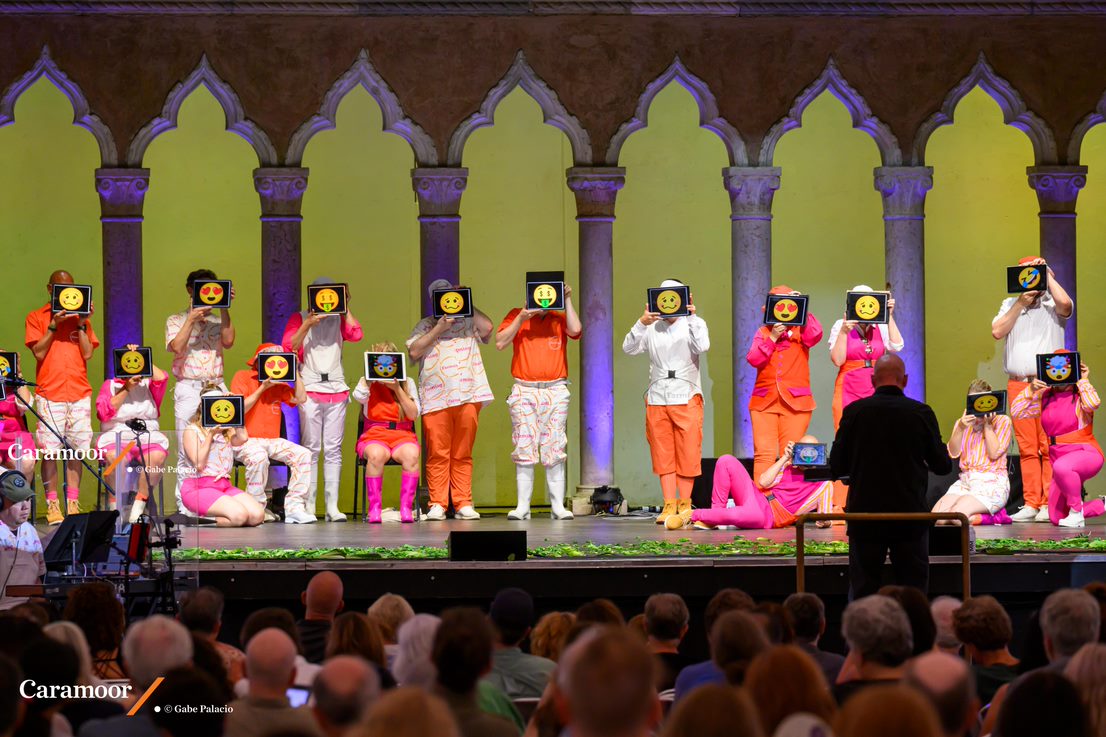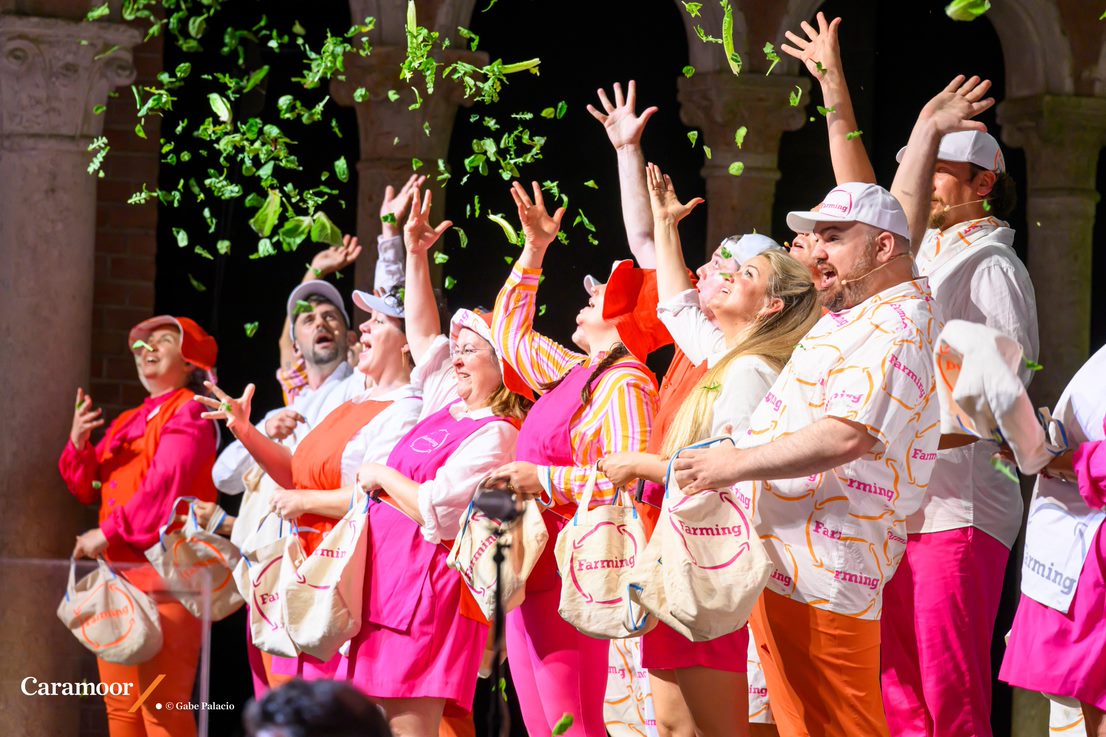Reviews
The Irony That Drives Ted Hearne's Latest, Farming
Be ready for anything from a new Ted Hearne piece.
Many of those in the free-of-charge audience at the Caramoor Summer Music Festival’s July 9 performance of Farming—the accomplished new work by this fearless, outspoken composer—were no doubt expecting something agricultural. Some sauntered in and out during the performance, others had small children in tow, and at least one of the local farming associations sent an inquisitive representative. What they got was a shotgun wedding of texts by William Penn, Jeff Bezos, Facebook messages from Uber Eats, tight-knit Manhattan Transfer-style harmonies, dance-club rhythm tracks, and absolutely nothing resembling corn as high as an elephant's eye. Originally planned for the outdoors, this performance (and previous ones following the Philadelphia premiere) was moved indoors, due to extreme weather.
Farming is the latest collaboration between The Crossing choir from Philadelphia and the 40-year-old Hearne, a Pulitzer finalist and Grammy nominee whose works are often confrontational (he took on Donald Trump in Animals) and often full of disparate elements. In this case, farming is used to emphasize how technology and profiteering have taken us away from the earth. The fourth movement, for example, titled “What Are Greens,” manages to eventually commoditize nature's gift of nourishment into loyalty points, leading into a movement titled “Gift Economy.” A Kafka-qesque turn yields a lot of bureaucratic data about the many kinds of VISAS. Though texts were printed in an on-line program, surtitles were badly needed.

The Crossing performs Ted Hearne's Farming onstage at Caramoor
“We’re back” is the opening exclamation, in the first of nine movements. The piece progresses into texts by Penn juxtaposed with Bezos: Penn describing land negotiations with the Lenape people who appear to need and want relatively little for their existence, and the expansive Bezos dealing with how technology can open new avenues of consumption.The piece could be a warning about the advertisement images being hammered into your psyche, or raise questions about the value in the goods that you’re told you must have. But there’s no sentimentality here, no dire consequences predicted, no public figures caught issuing totalitarian ideology.
Musically, Hearne hasn't settled into anything resembling a clear creative trajectory; he writes content-dictates-form pieces on current events, topics ranging from immigration to neighborhood gentrification, with a well-focused undercurrent of anger. Farming has a more consciously synthetic sound envelope than his other works. Some of the more exclamatory vocal writing—sometimes suggesting a modernized "Hallelujah Chorus"—is subtly interrupted by syncopation. All was sung with absolute assurance by the ever-communicative Crossing, each singer with their own microphone, with rock-solid conducting by Donald Nally. Some vocal lines are accompanied by particularly oppositional rhythms from electric guitar and digitally processed sounds. Arias are sometimes sung with the voice altered in disturbing ways.
 The vocal writing is full of pop-music gestures and slick, polished surfaces—often used to deliver salesman-speak—augmented by Hearne’s restless, reckless fragments of invention. Certain buzzwords such as “empower,” surely a cliché of our time, are obsessively spotlighted through repetition and hyped enthusiasm, thus emphasizing their meaninglessness. Prose text was feverishly shoehorned into tidy pop music motifs and rhyme schemes. Indeed, Hearne’s music can be so interruptive as to lack flow, but this time, he had it both ways: many bumps in the road but continuity maintained. The singers (under Ashley Tata’s stage direction) wore red, uniform-like costumes that resembled ice cream vendors’ from the 1950s. With so many disparate elements, the dots could be connected in many ways. Above all, Farming asks, how much is enough.
The vocal writing is full of pop-music gestures and slick, polished surfaces—often used to deliver salesman-speak—augmented by Hearne’s restless, reckless fragments of invention. Certain buzzwords such as “empower,” surely a cliché of our time, are obsessively spotlighted through repetition and hyped enthusiasm, thus emphasizing their meaninglessness. Prose text was feverishly shoehorned into tidy pop music motifs and rhyme schemes. Indeed, Hearne’s music can be so interruptive as to lack flow, but this time, he had it both ways: many bumps in the road but continuity maintained. The singers (under Ashley Tata’s stage direction) wore red, uniform-like costumes that resembled ice cream vendors’ from the 1950s. With so many disparate elements, the dots could be connected in many ways. Above all, Farming asks, how much is enough.
With such an unusual performing apparatus and a sensibility that the composer described as "glitchy" in the pre-concert lecture, Farming is destined to be a festival piece, and hopefully with a long life ahead of it. No doubt 4-H clubs are welcome, but they should be forewarned.
Classical music coverage on Musical America is supported in part by a grant from the Rubin Institute for Music Criticism, the San Francisco Conservatory of Music, and the Ann and Gordon Getty Foundation. Musical America makes all editorial decisions.





 FEATURED JOBS
FEATURED JOBS

 RENT A PHOTO
RENT A PHOTO


